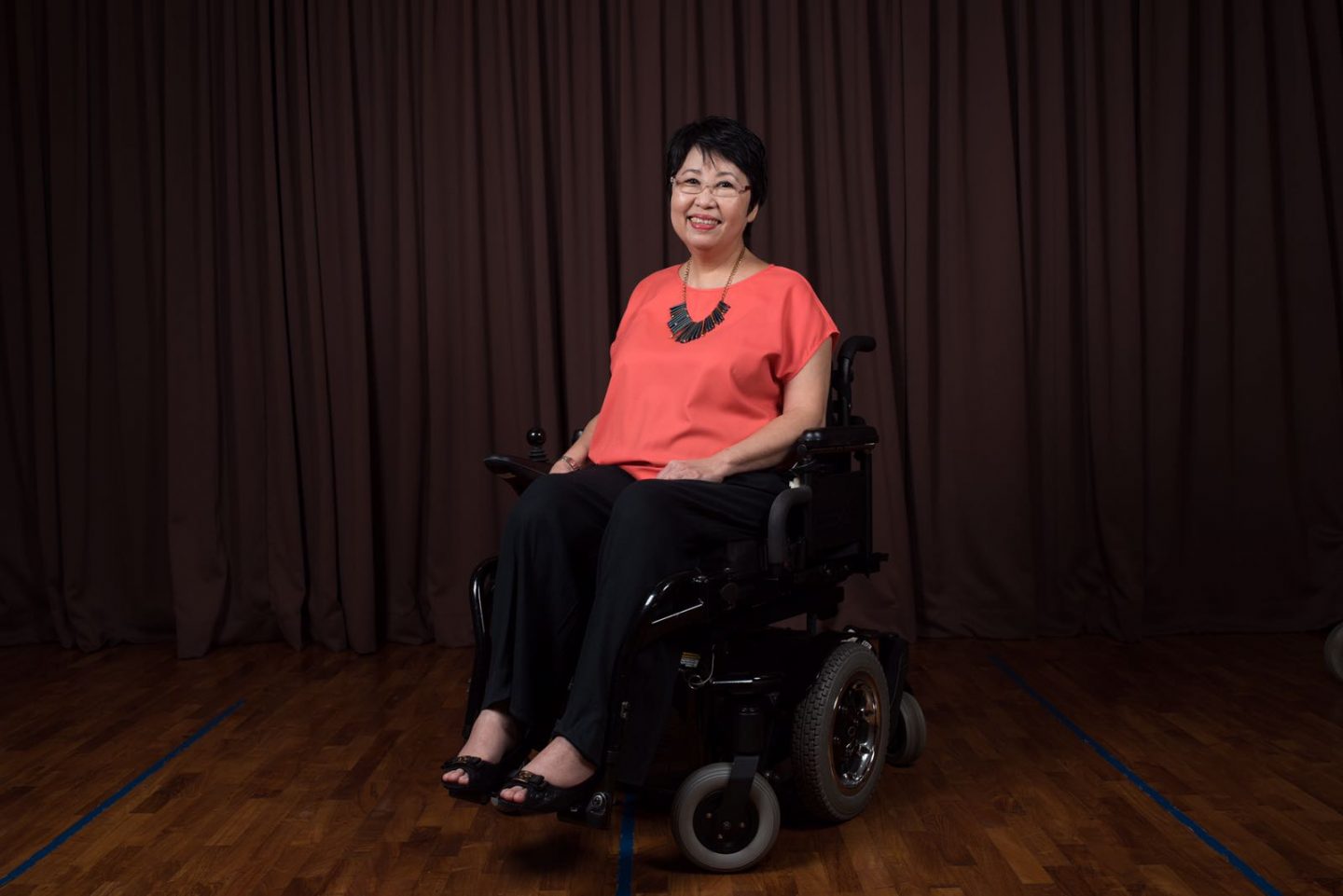“God gives me enough muscle for today”: Sherena Loh, head of the Muscular Dystrophy Association (Singapore)
by Pauline Loh // February 24, 2018, 10:53 pm

Sherena Loh is the executive director of the Muscular Dystrophy Association (Singapore). Photo by Goderic Tia.
“Why doesn’t your God heal you?”
It’s a question people used to ask Sherena Loh. It’s a question she used to ask herself.
No longer. Today, her life is a ready answer.
From her wheelchair, Sherena heads up the Muscular Dystrophy Association (Singapore) (MDAS). As its Executive Director, she manages 11 staff and more than 600 volunteers who run over 10 programmes serving 450 people with disabilities and their families.
“For many years, I struggled with God about my condition,” says the 59-year-old. “As a young person, I accepted the misconception that I was going to die young. I struggled with low self-esteem and lack of purpose. I went to healing rallies and struggled for a miraculous cure.
“But as I began to discover that my unique background allows me to serve people with disabilities, I found my purpose.
“Then I stopped asking questions that had no answers and asked more relevant ones, like: ‘What kind of programme would be most effective to meet my members’ needs?’ and ‘Who do I need to speak with to harness resources?’”
A sense of mission
It is this steadfast sense of mission that gets her up and going every day.
“I don’t call it ‘going to work’. It was God’s plan to bring me to MDAS – He commissioned me. By serving people, I know I am serving God,” says Loh.
“For many years, I struggled with God about my condition … But as I began to discover that my unique background allows me to serve people with disabilities, I found my purpose.”
There is more than a hint of courage in her resoluteness.
When asked what gets her out of bed every morning despite her challenges, she replies: “Firstly, I don’t get out of bed by myself. I have to wait for my domestic helper to transfer me from the bed to the wheelchair, and then to bathe and dress me.
“It teaches me to be humble,” she adds with a wry smile.
Her positivity belies the challenges of the debilitating disease. It is a condition where a person’s muscles deteriorate over time and is, in some cases, life-limiting.
“With weak muscles, I fell a lot as a youth,” she admits. “While I was still able to walk, there was once when I fell in a private housing estate in front of a pack of stray dogs. My muscles were too weak to allow me to get up without assistance. Nobody came out of their house, even though I shouted loudly for help.
“Another time, I fell and somebody came from behind and heaved me up. When I looked back, I was shocked to see that it was a pregnant woman. What if she’d suffered complications from the effort of helping me?
“My experiences steeled my purpose to promote awareness and accessibility for people with disabilities. If we cannot go out, how would we be visible and how would we help others to understand us? Many people with disabilities could not even leave their home in the past, because their apartment was not on a lift landing. Accessibility is better now, thanks to government efforts and public education.
“My experiences of falling in public made me realise that people do not know how to interact with people with disabilities. It is not that they are unkind, they simply do not know how to help.”
She suggests that if you come across disabled people who are struggling, empower them and preserve their dignity with the query: “Do you need help? How can I help?”
Unflagging advocate
While muscular dystrophy has never left her, God has never left her either, says Loh. She is a picture of confidence, and speaks with enthusiasm about her work.
“Highs and the lows can happen all in one day. For example, a staff falls sick, a media rep calls for statistics urgently, then a new family walks into the Centre with many questions about their child with muscular dystrophy, and at the end of the day, I get a call that one of our members has passed away. That’s a tough day, but at the same time, knowing that everything that happened is within God’s control and that I can turn to Him for wisdom and strength – that’s the high point for me,” she says.
News of members’ demise is not uncommon at MDAS. Medical support and welfare service can only help the grieving family to a certain extent.
“When family members need to talk about their fears of their child dying, they come to me. Because of my faith in God, I don’t view death as pantang (superstitious) or something fearful. God has built up my compassion to journey with families in the end stages.”
An unflagging advocate, she faces each day with Proverbs 16:3: “Commit to the Lord whatever you do, and He will establish your plans.”
“I’ve seen this verse come true again and again in my work. While my helper is getting me ready for the office in the morning, I pray for my staff, my volunteers, my members and their families.
“Visitors have walked into the Centre and said: ‘I like this place, it feels so comfortable.’ They didn’t know the reason why, but I knew! God is not simply God of the Sabbath. I bring God to my workplace every day.”
Her belief and passion in God’s commission for her life has proven to be stronger than mere muscles.
We are an independent, non-profit organisation that relies on the generosity of our readers, such as yourself, to continue serving the kingdom. Every dollar donated goes directly back into our editorial coverage.
Would you consider partnering with us in our kingdom work by supporting us financially, either as a one-off donation, or a recurring pledge?
Support Salt&Light


